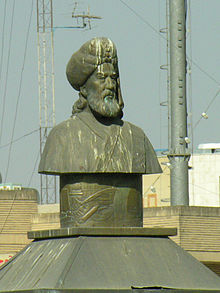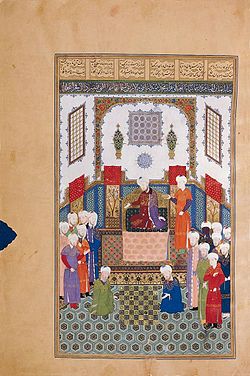Bozorgmehr
Bozorgmehr | |
|---|---|
 | |
| Native name | Dādburzmihr |
| Died | 580s |
| Allegiance | Sasanian Empire |
| Rank | |
| Relations | Sukhra (father) |
Bozorgmehr-e Bokhtagan (Middle Persian: Wuzurgmihr ī Bōkhtagān), also known as Burzmihr, Dadmihr and Dadburzmihr,[1] was an Iranian sage and dignitary from the Karen family, who served as minister (wuzurg framadār) of the Sasanian king (shah) Kavad I (r. 498–531), and the latter's son and successor Khosrow I (r. 531–579). He also served as the military commander (spahbed) of Khwarasan under Khosrow I and his successor Hormizd IV (r. 579–590). According to Persian and Arabic sources, Bozorgmehr was a man of "exceptional wisdom and sage counsels" and later became a characterisation of the expression. His name appears in several important works in Persian literature, most notably in the Shahnameh ("The Book of Kings").[2] The historian Arthur Christensen has suggested that Bozorgmehr was the same person as Borzuya, but historiographical studies of post-Sasanian Persian literature, as well as linguistic analysis shows otherwise.[2] However, the word "Borzuya" can sometimes be considered a shortened form of Bozorgmehr.[3]
Name
The name of the Bozorgmehr (meaning "large sun" or "one of great kindness") is the New Persian variant of Middle Persian Wuzurgmihr ī Bōkhtagān, which was later transformed in Arabic as Abūzarjmehr, Bozorjmehr, or Būzorjmehr.[2][4] Ferdowsi used the last variant in the Shahnameh ("The Book of Kings").[2] Etymologically the latter is a corruption of Burzmihr or Dād-Burzmihr, also reported as Zarmihr.[4] Its proper version was Dādburzmihr, with Būrzūmihr being the original variant in ancient engravings.[4][5] The name is attested as Dadburzmihr ("given by the high Mihr") in a seal, a theophoric name that emphasizes the Mihr worship of Bozorgmehrs clan, the Karenids.[6] The -i Bōkhtagān suffix is a patronymic name meaning "son of Bokhtagan", a title held by Bozorgmehrs father.[4]
Background
Bozorgmehr is first mentioned in 498, as one of the nine sons of the powerful nobleman
Career

After Kavad I had reclaimed the Sasanian throne from his younger brother Jamasp in 498, he appointed Bozorgmehr as his minister (wuzurg framadār).[5] During his tenure, Bozorgmehr persuaded Kavad to stop taxation on fruits and grain from the peasantry.[5] An early reference to Bozorgmehr is found in the Aydāgār ī Wuzurgmihr, in which he is called an argbed—a high-ranking title in the Sasanian and Parthian periods. Among other sources, later mention of him is made in the Shahnameh and in al-Tha'alibi’s Ghurar and al-Masudi’s Murūj al-Dhahab.[2] During the reign of Kavad I's son and successor, Khosrow I (r. 531–579), Bozorgmehr continued his tenure as minister of the shah. He further rose to prominence after being appointed as a military commander (spahbed) of the kust (frontier region) of Khorasan (Khwarasan) by Khosrow I, who reportedly regretted Kavad I's approach to the family.[14][8]
During the reign of Khosrow I's son Hormizd IV (r. 579–590), Bozorgmehr continued to serve as spahbed of the Khorasan.[5] Two seals of Bozorgmehr have been found; Through both of them Bozorgmehr emphasizes his Parthian ancestry by claiming to be a Parthian aspbed (aspbed-i pahlaw).[1] According to Ferdinand Justi, Bozorgmehr was later executed by the order of Hormizd IV.[2] His execution probably lead to the legendary story of the royal resentment reported in various versions by al-Masudi, Ferdowsi, and al-Tha'alibi.[2] The versions of Ferdowsi and al-Tha'alibi, which link Bozorgmehr with the reign of Khosrow I, he was reportedly pardoned by the shah, who was well-known for his fairness.[2] In the version of al-Masudi, Bozorgmehr was linked with the reign of Khosrow II, where no mention of his execution is made.[2]
Bozorgmehrs descendants continued to remain active in Iran, with one of them, Adhar Valash, ruling Tabaristan and Gurgan under the last Sasanian shah, Yazdegerd III (r. 632–651).[15] His grandson, Valash, ruled Tabaristan from 665 to 673.[16][9]
Works
Several Middle Persian treatises were written by Bozorgmehr. Most famous is the Wizārišn ī čatrang ("Treatise on Chess"), also known as the Chatrang Nama ("Book of Chess"). As well as; Ayādgār ī Wuzurgmihr ī Bōxtagān, Ketāb al-Zabarj (the original version a commentary on Vettius Valens’s Astrologica), Ketāb Mehrāzād Jošnas ("Book of Mehrāḏar Jošnas") and the Ẓafar-nāma ("Book of Victory", a book written in Middle Persian, that was translated into New Persian by Avicenna.[2]
References
- ^ a b Pourshariati 2008, p. 115.
- ^ a b c d e f g h i j Khaleghi-Motlagh 1989a, pp. 427–429.
- ^ Khaleghi-Motlagh 1989b, pp. 381–382.
- ^ a b c d Majidi & Negahban.
- ^ a b c d Pourshariati 2008, p. 114.
- ^ Pourshariati 2008, pp. 114–115, 379.
- ^ Pourshariati 2008, pp. 113–114.
- ^ a b c d Pourshariati 2017.
- ^ a b Chaumont & Schippmann 1988, pp. 574–580.
- ^ Pourshariati 2008, p. 78.
- ^ Pourshariati 2008, p. 80.
- ^ Daryaee 2014, p. 27.
- ^ Schindel 2013a, pp. 136–141.
- ^ Pourshariati 2008, pp. 114–115.
- ^ Pourshariati 2008, p. 303.
- ^ Pourshariati 2008, p. 307.
Sources
- Chaumont, M. L.; Schippmann, K. (1988). "Balāš, Sasanian king of kings". Encyclopaedia Iranica, Vol. III, Fasc. 6. pp. 574–580.
- ISBN 978-0857716668.
- Khaleghi-Motlagh, Djalal (1989a). "Bozorgmehr-e Boktagan". Encyclopaedia Iranica, Vol. IV, Fasc. 4. pp. 427–429.
- Khaleghi-Motlagh, Djalal (1989b). "Borzūya". Encyclopaedia Iranica, Vol. IV, Fasc. 4. pp. 381–382.
- Pourshariati, Parvaneh (2017). "Kārin". Encyclopaedia Iranica.
- Pourshariati, Parvaneh (2008). Decline and Fall of the Sasanian Empire: The Sasanian-Parthian Confederacy and the Arab Conquest of Iran. London and New York: I.B. Tauris. ISBN 978-1-84511-645-3.
- Schindel, Nikolaus (2013a). "Kawād I i. Reign". Encyclopaedia Iranica, Vol. XVI, Fasc. 2. pp. 136–141.
- Majidi, Maryam; Negahban, Farzin. "Buzurgmihr". In ISSN 1875-9831.
